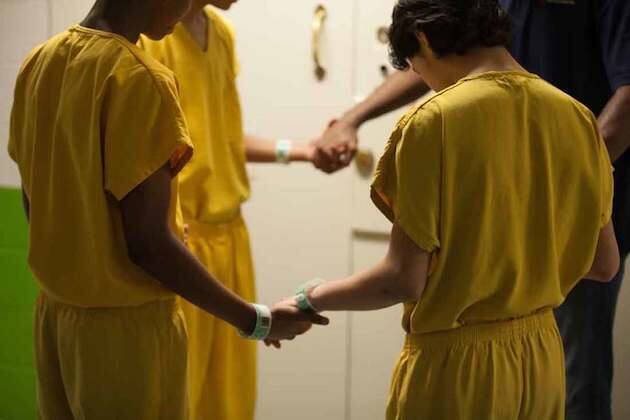‘God showing up’ – Youth For Christ replaces loneliness with hope in juvenile detention centers

“I was totally lost, really hopeless and ashamed of what I was doing with my life. I was in a hopeless spot at a time where I didn’t really care what happened with me,” shares a teen remembered a turning point in their life. “It was in the YFC (Youth For Christ) chapel and detention center. That’s when I really started to feel the Lord, his presence. I found a sense of peace.”
“Those moments are the moments that we live for, because it’s God showing up,” shared Curtis Wright, Youth For Christ Kansas City Director of Juvenile Justice Ministries.
Youth For Christ is a multitude of ministries that has been active since 1944. Through ministry arms such as Campus Life, Deaf Teen Quest, Campus Life Ministry, City Life, Parent Life, and Juvenile Justice Ministry, the organization extends non-judgmental love and support to teens whose choices and circumstances might lead them to despair.
The ministry, by sharing the hope of Jesus Christ with them, has helped countless teens overcome those temptations.
“Youth For Christ – Parenting Life, was launched in Kansas City because of the relationships staff and volunteers made with the kids they met in the Juvenile Justice Ministry. Youth For Christ has the non-judgmental love of Jesus in its DNA,” Stephanie Magee, Superintendent of Jackson County Juvenile Detention Center, told Metro Voice.
YFC has considerable credibility in and out of ministry. Reverend Billy Graham was the ministry’s first full-time staff member. With more than 160 chapters that seek out and serve youths from all walks of life and exposing those teens to the power of a loving God, it has innumerable success stories as well.
The ministries are both urban and rural on a mission about the message of Jesus. Today the organization is national and reaches young people by working with local churches and other like-minded partners to raise up lifelong followers of Jesus who lead by their godliness in lifestyle, devotion to the Word of God and prayer, passion for sharing the love of Christ, and commitment to social environment.
Alex Mathew, YFC Kansas City Executive Director, says that Covid and the resulting lockdown and now social-distancing guidelines have provided unique challenges. “Many of the teens in juvenile detention centers feel loneliness away from their families and friends,” Mathew states. “The COVID-19 pandemic has presented a unique set of challenges for the juvenile detention centers. Without visitation, programming, and even school, spending time in the facility can cause a lot of anxiety and stress. Additionally, many of their court cases have been delayed due to closing and complications in the court system.”
Mathew says that the administration and staff at their local facilities have worked hard to access virtual visitation and programming, “but it has been a long and complicated process now that meeting face to face with the teens is not always possible,” he shared.
Youth For Christ has also been following the guidelines of the counties and states where they aimed at slowing the spread of COVID-19. This meant that for March and most of April Youth For Christ was not allowed in local juvenile detention facilities. Currently, only their YFC staff and a few key volunteer site leaders are serving in-person.
“As some restrictions were lifted, we worked with the administration at each facility to fully understand and adhere to their COVID-19 safety precautions. Before entering any of the facilities, we are equipped with masks and personal hand sanitizers. We also get our temperatures checked by facility staff and are asked COVID-19 screening questions. During programming, we space chairs six feet apart and maintain social distance, other than greeting the youth with elbow bumps,” Mathew said.
Keeping up with changing uses of technology and the ability of facilities to offer that is also a priority. “As technology for virtual programming continue to increase at the detention facilities, we will be trained on these systems so that we can utilize them if higher restrictions are implemented, and we lose physical access to the space,” he stated.
To better understand how teens react to the juvenile detention facility in which they are placed, President and CEO Dan Wolgemuth, along with fellow YFC executive-level employees, voluntarily booked into a juvenile detention center for 24 hours to help him understand and relate to the incarcerated teens served by YFC’s Juvenile Justice Ministry (JJM) program.
Wolgemuth says even Jesus identified prison ministry as an opportunity for Christians to practice compassion toward the incarcerated. And it’s not different with teens.
“Jesus said, ‘I was in prison, and you came to me.’ And immediately you realize that the loss of any kind of freedom is so suffocating,” Wolgemuth said. “When they look at you and sort of let you enter into their world, then you feel like you’ve got an opportunity to talk about what hope can look like. And you realize again, that unless you deliver the power and message of Christ, these kids don’t have a shred of hope for transformation.”
Prior to the COVID-19 pandemic, the ministry had already been deeply involved with the juvenile justice system. Although a teen or young adults poor choices may have its origin in substance abuse or criminal activity, Mathew believes the cause is from a much deeper place in their lives – the erosion of the family.
“We realized we don’t have a crime problem, drug problem, or a prison problem. What we have is a father problem in this country. We have a family problem in this country. And so we just want to model that (a family) in Youth For Christ,” Mathew said.
Yet, during this time of uncertainty, the ministry sees a lot of hope with the these young people.
https://www.facebook.com/yfcusa/posts/10157894685878089
“At each Sunday service, youth engage in worship, look up Bible verses, and actively engage in conversations. We work hard to respond to their questions and meet them where they are at, and help them encounter God in whatever way He desires at that moment.”
Mathew shared how recently a youth asked what it means to “Glorify God”. “We spent the following Sunday learning about this and practicing it. Although the participants did take comfort knowing that they have a community of people praying for them, they also take time to pray for others. They pray for the pandemic to go away, they pray for protection over the youth next to them, and they pray for their families at home,” said Mathew.
Mathew is optimistic, even when the news is less than positive. “During this uncertainty,” he says “we see a lot of hope!
Nationally, Youth For Christ is telling inspiring stories like these through #YFCBeTheStory, an initiative to help spread the word across the nation about how YFC chapters are making a difference in their communities.
Youth For Christ’s 3Story encourages staff and volunteers to be good news while telling stories of the Good News of Jesus. It involves building relationships through the ups and downs of day-to-day life in order to lead people to Christ. For more information, visit 3Story.org.
Visit the Youth For Christ media page here. Learn more about Youth For Christ at its website, www.yfc.net, Facebook and Instagram pages, Twitter feed @yfcusa or on Vimeo.
–Amy Buster | Metro Voice










